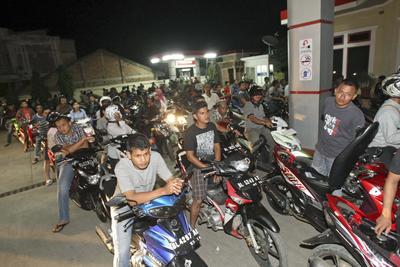After last-minute negotiations, all the ruling party could do was accept a weak compromise that gave the government the authority to raise the fuel price at some point in the future under certain stringent conditions.
This outcome may represent an improvement on the status quo, but it also amounts to a humiliating political defeat for the president. Two and a half years before the next general election, this defeat has weakened the president immeasurably, further confirming his inability to control his own coalition. Indonesia now faces the possibility of policy drift and an unexpectedly early start to the 2014 presidential race.
President Yudhoyono’s resounding electoral victory in 2009 gave him not only a second term in office, but the best chance in a generation to significantly reduce the fuel subsidy or even eliminate it altogether. The 2011 and the 2012 budgets were important opportunities to achieve this — but the president inexplicably declined to take advantage of either. The 2012 budget, for example, included a provision that expressly prohibited the government from raising the fuel price.
To make matters worse, the international oil price has climbed since the budget was approved, causing the subsidy to soar. The 2012 budget deficit could now breach the 3 per cent of GDP ceiling set by parliament and jeopardise the investment-grade credit rating Indonesia achieved in December 2011. While maintaining budget discipline and the country’s credit rating may be the proximate reason for raising the domestic fuel price, there are more important arguments for doing so.
First, the subsidy’s incidence is regressive, so it primarily benefits high-income households that tend to consume the most fuel. Second, reducing the subsidy could yield budgetary savings, part of which could go to the poorest to compensate for higher fuel prices. The rest could be used to finance public transportation and desperately needed transport infrastructure, both of which constrain economic growth in Indonesia. Third, higher fuel prices will help increase energy efficiency and ease traffic congestion on Indonesia’s congested roads. Fourth, as Indonesia now has the lowest domestic fuel price in Asia, it is out of step with the rest of the world, which is trying to reduce its reliance on fossil fuels, protect the environment and mitigate climate change. And fifth, Indonesia is now a net energy importer. A low domestic fuel price makes it more dependent on imported energy and more vulnerable to energy price shocks from abroad.
The government is partially to blame for the fact that public opinion remains set against any increase in the fuel price, because the government did not do enough to communicate the compelling case for its proposal. But it is not merely a matter of communication: the public’s trust in the government has diminished severely and the media has openly questioned whether the government would effectively use additional resources resulting from cutting the fuel subsidy for high-priority development programs.
Indonesia now ranks 100th out of 183 countries on Transparency International’s Corruption Perceptions Index, which also found Indonesia’s parliament to be the country’s most corrupt institution. Prominent law makers — some in the president’s own party — are under a cloud of suspicion. Unless law makers and the government earn a reputation for clean governance and reclaim the public’s trust, the electorate is unlikely to give them the leeway they need to make bold decisions that may hurt in the short term but serve the national interest in the long term.
Indonesia needs strong leadership, and President Yudhoyono could still provide it. Previous administrations have faced down violent demonstrations and succeeded in raising fuel prices when needed — and the current administration will need to follow suit before it is too late.
But even if the government manages to raise fuel prices, it must then also use the budgetary savings judiciously and make sure every cent goes to high-priority social and infrastructure programs. Not only will this return Indonesia to the right growth path, it will also restore the current administration’s image as assertive — and this will be beneficial in tackling other looming challenges in the remaining half of President Yudhoyono’s five-year term.
Vikram Nehru is Senior Associate in the Asia Program, and Bakrie Chair in Southeast Asian Studies at the Carnegie Endowment for International Peace.
An earlier version of this article was first published here by the Carnegie Endowment for International Peace.

